#Passion for mythology
Explore tagged Tumblr posts
Text
Ooooh epic girlies (mostly on TikTok) I am BEGGING you to learn the mythology because no. No no no Circe and Calypso are not girlboss. No you do not want to ship them with Odysseus.
Girl I am begging you. Do not call original Odysseus a cheater I am still saying it. Don’t go down this path girl. Hold my hand and we will read the myths together so you understand
#I’m passionate about the Odyssey#if you couldn’t tell#the odyssey#epic the musical#Odysseus#greek mythos#greek myth#greek mythology
5K notes
·
View notes
Text

Follow me on Instagram! @4h20.art
#antinous#aesthetic#collage#collage art#edit#artist#art#ancient greece#greek mythology#statue#sculpture#digital art#artwork#artists on tumblr#illustration#drawings#digital painting#couple#intimacy#touch#romantic#couple goals#passion
2K notes
·
View notes
Text
Hebe comforting Ganymede
474 notes
·
View notes
Text
Day 2: Hyacinthus
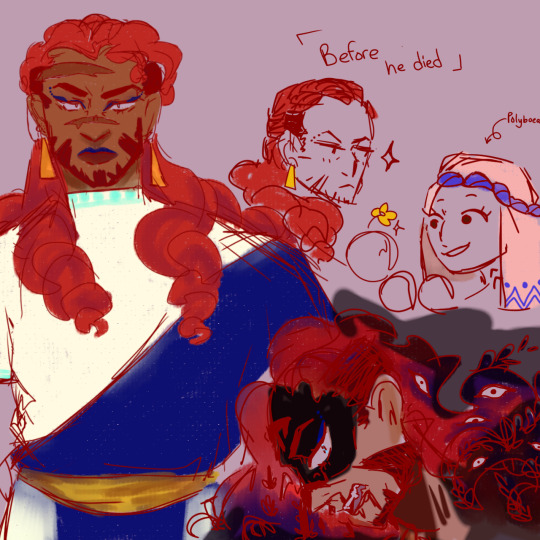
Interpretation notes and trivia below the cut!
Designing Hyacinthus as well as deciding on a personality for him was one of the first big problem I had to solve when the topic of a retelling came up. In most texts, he exists to be loved and then to die and even then, the focus of his death is not his own but rather on Apollo, the one who loses him. General modernised interpretations of him likewise tend to make him agreeable and inoffensive, the sort of character who is likeable and upright but never challenging or ornery. I didn't like any of those options, so I instead decided to build my Hyacinthus from the ground up - for better or for worse. His red hair is his most striking feature, it is his mother's divine hair colour and he is the only one of her children to have inherited it. Similarly, Hyacinthus is the only one of his mother's children to inherit her magic. While some of his siblings were born with a few passive gifts from their mother (Argalus' 'perfect' memory and Polyboea's affinity for mental calculations and projections, for example) Hyacinthus was born with a talent for sealing and warding magic and thusly, much of his life has been shaped by the pursuit of knowledge and his wish to use his talents to better his kingdom. Much of his good-nature and zeal for life and learning is destroyed by the circumstances of his death and entombment. When he is revived, he is angry, lost, devoid of most of his memories and desperate to fill the missing gaps of his soul. He's selfish and snappish, hurt and desperate to hurt others but, most importantly, he is searching. When he is revived, all the world has heard his story but he is not apart of it. They do not remember Hyacinthus, the mage-prince of Amyclae or Hyacinthus, the teacher of men. They do not speak of Hyacinthus, who charmed the gods for their knowledge or Hyacinthus whose beauty was bested only by his wit - they speak of Apollo and his lost love, Apollo and his grief, Hyacinthus, the lover of the Radiant. One can only hope that he will find whatever it is he is looking for on this journey.
Some fun trivia:
Youngest son in a family of seven, his magic was the catalyst for Clio revealing her true identity as a Muse to her children.
Actually prefers to be called 'Hyacinth' but has made peace with people ignoring his wishes and just calling him Hyacinthus out of habit or formality.
Has an intense resting bitch face and struggles with visibly expressing happiness or sadness. This is also a trait he shares with his mother, though his older sister Hegesandre also shares this feature. Cynortas was technically a part of the resting bitch face club but he practiced smiling and looking cheery so much as a child that now has the opposite problem where he can smile through anything, even pain or anger.
Left home when he was 10 to study at the Parnassus Institute for Gifted Children. The Institute specialises in training the children of the Muses, but occasionally it will take in normal people who show great promise. Hector, who becomes quite close to Hyacinth during their tenure together, was one of those people.
Was recognised by Apollo himself at his graduation and was gifted a laurel wreath. Apollo declared him the Shepherd Laureate which made Hyacinth the third Laureate alive at that time - a status shared only by Orpheus, the Poet Laureate and Asclepius, the Doctor Laureate.
Despite his title, is atrocious with animals and genuinely despises both sheep and goats. Has a mild phobia of goats in particular due to a traumatic incident when he was first climbing the mountain where a particular wild goat absolutely terrorised him. Along with following him for days, it would eat anything he left unattended and even bit and headbutted him numerous times when he would try to wrestle his food back from it. He was so bothered by the title in fact, that he asked Apollo if the designation was a joke at his expense. Apollo never denied that it was a joke but he never confirmed it either.
Exceptional hunter but prefers trapping to hunting by dog or arrow. Has never been one for weapons and much rather prefers to fight bare handed if the occasion arises.
Despite his laurel wreath being such a precious object, Hyacinth has never properly worn it. He wore them around his left bicep after obtaining them and when Polyboea contracted phthisis and needed comforting, he gave them to her as an object that would give her strength. Polyboea was buried with his laurels so he never got the chance to wear the wreath on his head.
His favourite colour is a dark oak brown and his favourite hobby is reading. His favourite food is fish roasted by a river and shared with people he loves. He died at 28 on the first day of Karneios.
#ginger draws#pursuing daybreak posting#ugh I love him I love him SO much#I'm very deliberately making it a point to not talk about his life post resurrection because that's#actual spoiler stuff but there's so many things to chat about in his life before his death lmao#Hyacinth prior to his death and after his revival are very different but if I had to describe his character overall in one word#it would be passionate. He's very driven and very focused on pursuing what he thinks is right or good even if it means death#He fell in love with Apollo because he recognised a kindred spirit in him even if he was disguised when they first met#I really hope he finds what he's looking for and that it makes him happy#hyacinthus#greek mythology#october art challenge
55 notes
·
View notes
Text
random Cabin 10 / Aphrodite kids headcanons

˚ʚ♡ɞ˚
They keep a meticulous track of who is dating who, whose crushing on who, who isn't is rejecting who, ect. They also have a betting pool around certain relationships and campers. artistic rendition of Aphrodite campers presenting their romance predictions for the summer:

˚ʚ♡ɞ˚
They host charity events around Valentines. Its important to them that people spend the day with their loved ones, but also to make sure that love is shared around everywhere and with everyone. ˚ʚ♡ɞ˚
They may not be as big readers as the Athena kids, but they do have each their own favourite couple in history and media that they are ride or die for. They can even go toe-toe with Athena's kids in debates over these couples, arguing about their favourite relationship's historical legitimacy/basis or canon. ˚ʚ♡ɞ˚
Aphrodite kids aren't known for enthusiastically participating in training or camp activities, but like water is to Percy, love is a powerful adrenaline rush. When they're fighting for someone or something they truly love, they can become incredible warriors and protectors even if its only for a short time. ˚ʚ♡ɞ˚
Marilyn Monroe was a child of Aphrodite. I will die on this hill. ˚ʚ♡ɞ˚
Despite their reputation of being quite vain, children of Aphrodite can be intensely devoted and self sacrificing when it comes to those they care about and matters of love. Being loved by a child of Aphrodite means discovering what it means to be worshipped like you are the moon to their tide, the air to their lungs. ˚ʚ♡ɞ˚
If you have a nasty break up with a child of Aphrodite, the next few dates you try to go on will go terribly and embarrassingly wrong. The bad luck will fade eventually, just long enough to create a few truly cringe worthy memories. ˚ʚ♡ɞ˚
Cabin 10 campers host make up and wardrobe workshops semi regularly, giving advice to those that want it. They also collaborate on theatre projects the Apollo and Dionysus kids sometimes put on, mostly in make up/costuming/hair, but occasionally as captivating romance leads or as script consultants for love stories (in fact they get quite offended if you don't even ask any of them to at least read over your script). ˚ʚ♡ɞ˚
Weddings or engagements where part of the couple is a child of Aphrodite is massive affair. The whole cabin gets together for it, no matter where they live at this point in their lives. They also perform some really old ancient rites to honour Aphrodite and to ask her to bless their sibling in their relationships future. ˚ʚ♡ɞ˚
When children of Aphrodite go to battle, they wear something of their lover. Sometimes something simple like a picture of them, favourite jewellery of their lover's, their lover's lucky underwear, a hair piece from their love ect, or it can be as something as intimate as a lock of hair or even an ash diamond (if they've passed away). If they don't have a lover, then they wear something symbolic of their mother for her protection. Most popularly this is a dove feather or pearl jewellery, even both at once.
#thanks for listening to my rambles#Feel free to add your own :)#I have a lot of feelings about children of aphrodite#im not against flaws but sometimes I wish they were portrayed as more than just vain non-combatants#I think they can be petty vindictive vain AND passionate adoring sweethearts#children of aphrodite#cabin 10#Aphrodites cabin#Aphrodite cabin#cabin 10 aphrodite#pjo#percy jackson#percy jackson and the olympians#percy jackson series#pjo halfbloods#pjo aphrodite#greek mythology#silena beauregard#piper mclean#heroes of olympus#no children of aphrodite slander in my house#just musing
217 notes
·
View notes
Text
Jinx, Janna, and poetic symbolism
Janna appears as a blue bird, sometimes right?
Jinx is associated with crows, who are not just black (there's a blue glow to them), and strait up; there's Jinx’s bright blue hair.
Janna's associated with wind, and there's the saying 'The winds of change'. Chnage is what is needed and what seems to be rising (violently).
Janna is also associated with storms, albeit to protect.
Storms are signs/harbingers of upheaval, conflict, transformation, and passion. It's charged littraly and figuratively.
Jinx seems to be a blue coloured nexus of (violent) reactions/change.
So, with that, Jinx is a darker blue bird, harbringer of change, who will bring the storm to your door.
Is it only Janna's symbolism applied as a 'pr stunt', so to speak?
An aspect of Janna?
Or more?
I hope we get some insights.
#arcane#jinx#janna#zaun pr stunt?#or is there something other involved#symbolism#storms emotionaly stand for passion#be that anger or love#bkth something jinx carries a lot of#(Surries away to stuff the art#styalistics#and mythology gremlin back into her box for a week)
38 notes
·
View notes
Text
Hephaestus: I'm sorry... I-I'm probably just boring you with all of this metals facts. Aphrodite: No, no. I think it's cool. It's just your passionate it's just impressive to me... *Hephaestus blushes since no one ever listened*
#incorrect greek gods#greek myths#greek gods#greek incorrect quotes#greek mythology#ancient greek#ancient greece#hephaestus#aphrodite#aphrodite x hephaestus#heph#dite#aphrodite always listens to him#his passion is one of her favorite things
128 notes
·
View notes
Text

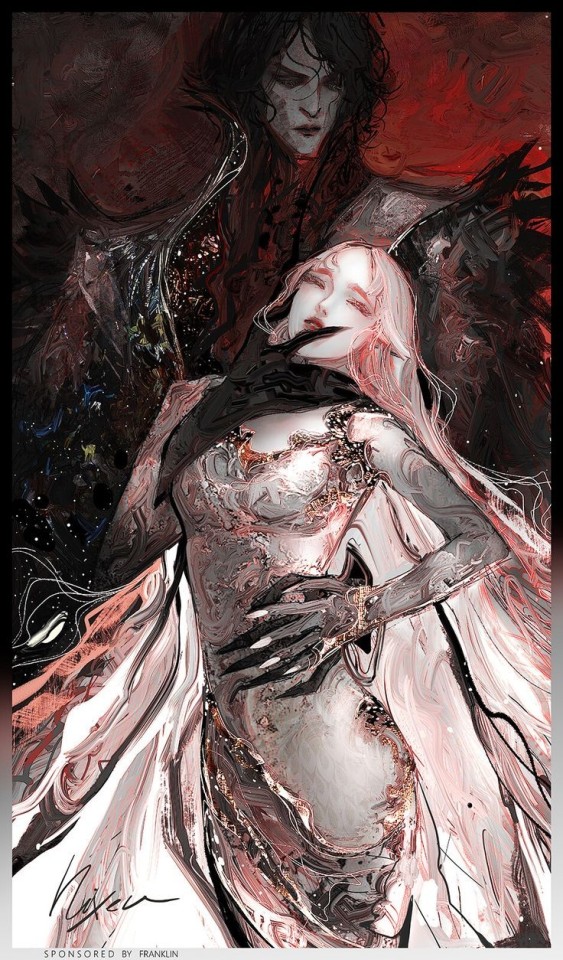
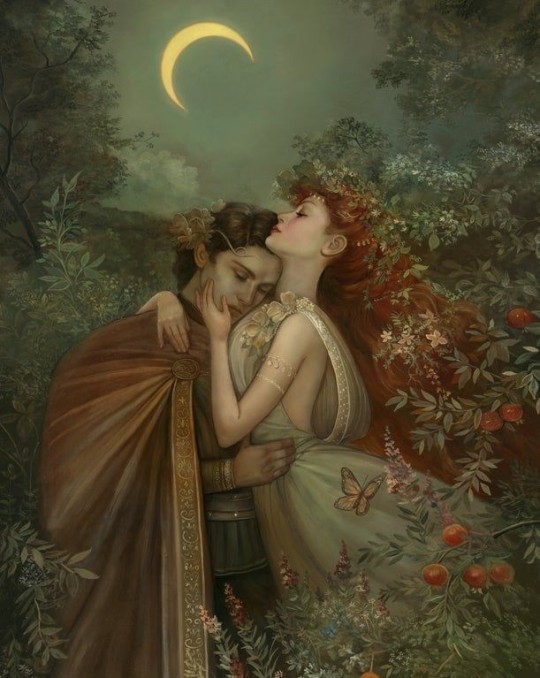
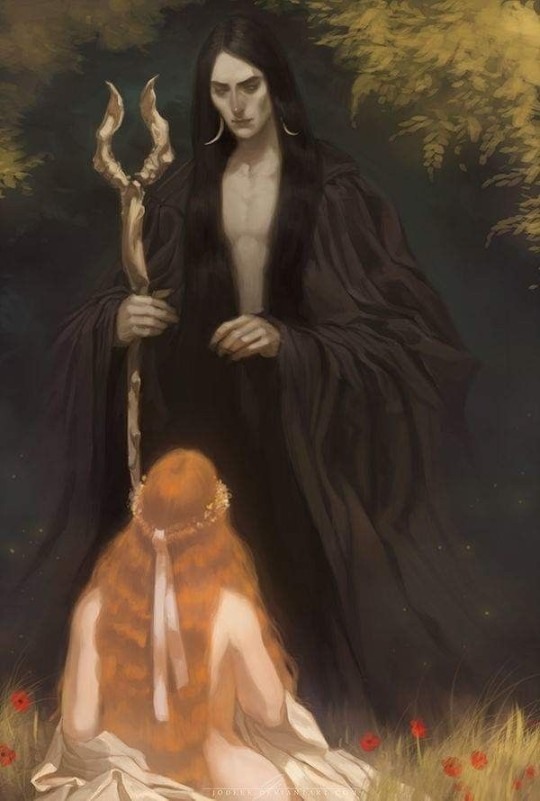
credits(from left to right):
Persephone by Purrcelot(Twitter)
Hades and Persephone by Nixeu(Facebook)
Hades and Persephone by Annie Stegg
Hades and Persephone by jodeee.
Thanks to @vanellq77 ���️❤️
#hades fanart#fyppage#gothic#darkness#late night#night sky#vampire#halloween#witchcraft#darkcore#dark moon#hades and persephone#persephone#hades lore olympus#classical mythology#greek myth fanfic#lovers#rivals#passion#lovescars#romance#dark romance#dark royalty#hell hound#inner peace#vampire lover#dark romanticism#heavy heart#roman mythology#greek gods
918 notes
·
View notes
Text
“patroclus is dead my lord”
*achilles almost kills the guy *
*briseis (he js slept w her) comes behind him to comfort achilles *
*achilles strangles her and throws her to the ground *
ACHILLES WAS NOT IN LOVE WITH PATROCLUS
#anyways i acc hate the troy movie w a burning passion#why is odysseus younger than pat and achilles?#why are pat and achilles cousins?#and why do they still look at each other like they want to make out?#patrochilles#troy 2004#achilles#patroclus#greek mythology
27 notes
·
View notes
Text
wish i was immortal because i want to learn about neuroscience, astronomy, psychology, philosophy, evolution, microbiology, history, mythology of different cultures and much more while also acquiring more and more languages and reading books from all around the world from all times and make art and people watch from a cozy lil window nook with a cup of coffee warming my hands
well i'm not immortal so i'll make it my life's mission to do as much of this as possible, my life is to be full of constant learning <3
realizing i make quite a few posts like this but eh
#language learning#learn#education#learning#life#reality#writing#aesthetic#studyblr#passion#knowledge#wisdom#honesty#understanding#evidence#science#neuroscience#astronomy#psychology#philosophy#evolutionarybiology#microbiology#history#maturity#authenticity#acceptance#myths and legends#roman mythology#mithi's own#musings from thy truly
33 notes
·
View notes
Text

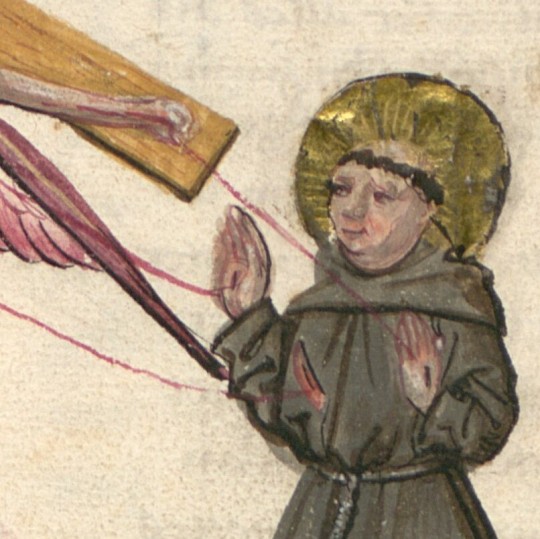
st. francis receiving the stigmata
in the "buch der heiligen dreifaltigkeit" ("book of the holy trinity"), alchemistic illuminated manuscript, bavaria, late 15th c.
source: Munich, Staatsbibliothek, Cgm 598, fol. 166v
#love how it looks like jesus is exuding laser beams#some interesting context about the book from wikipedia:#The treatise describes the alchemical process in terms of Christian mythology. The theme of the book is the analogy of the passion#death and resurrection of the Christ with the alchemical process leading to the lapis philosophorum.#The text is one of the most important alchemical works of late medieval Germany.#15th century#alchemy#st francis#christian iconography#stigmatization#medieval art#illuminated manuscripts#saints#wounds
332 notes
·
View notes
Text
For those that are interested in my attempts to write the Poetic Edda into the so-called haiku meter, I've posted a free to read excerpt of Loki's Haiku Duel to my Ko-Fi page
If there's enough interest, I may consider (read: definitely will) post the full poem to my Ko-Fi page.
#butchering eddic poems is my passion#north sea poet#heathenry#poetry#lokasenna#my poetry#bragi#nico solheim-davidson#heathen#norse mythology#norse paganism#my poem#my own poetry#loki#haiku poetry
97 notes
·
View notes
Text
Ganymede & The Eagle



#greek mythology#ganymede#zeus#ganymede and zeus#i hate zeus with a burning passion#justice for ganymede#digital art
381 notes
·
View notes
Text

Joanna Karpowicz, Anubis On The Red Couch
#feral beast#red#passion#anubis#mythology#light and darkness#shadow work#pawo#shaman#mature masculine#nurture#teacher#love#lust#open invitation#sacred space
27 notes
·
View notes
Note
As usual I read your tags always and so you said Apollo did not ask for resurrection of Asclepius and Hyacinthus so i just wanted to share this. About Asclepius death I read it on theoi.com, that earlier authors don't make him resurrect as a god but that's a later development mentioned only by Roman authors like Cicero, Hyginus and Ovid. But still Apollo has a role in Ovid's version
Ovid, Fasti 6. 735 ff (trans.Boyle) (Roman poetry C1st B.C. to C1st A.D.) : Clymenus [Haides] and Clotho resent the threads of life respun and death's royal rights diminished. Jove [Zeus] feared the precedent and aimed his thunderbolt at the man who employed excessive art. Phoebus [Apollon], you whined. He is a god; smile at your father, who, for your sake, undoes his prohibitions [i.e. when he obtains immortality for Asklepios].
So here it is actually because of Apollo the decision was taken to resurrect him as god. And with Hyacinthus, I don't think I've read about Artemis playing the primary role. I know in Sparta there was a picture of Artemis, Athena and Aphrodite carrying Hyacinthus and his sister to heaven.
This is not on theoi.com but I saw on Tumblr it's from Dionysiaca by Nonnus
Second, my lord Oiagros wove a winding lay, as the father of Orpheus who has the Muse his boon companion. Only a couple of verses he sang, a ditty of Phoibos, clearspoken in few words after some Amyclaian style: Apollo brought to life again his longhaired Hyacinthos: Staphylos will be made to live for aye by Dionysos.
So since he is singing inspired by amyclean stories it probably means in that place it was believed Apollo was the one to bring back his lover to life.
Apollo as god of order was very important so i think it shows how special these people (and admetus too) were to him that he decided to go against the order for them 🥺
ANON!! Shakes you like a bottle of ramune!! BELOVED ANON!!!!! I'm littering your face with kisses, I'm anointing you with olive oil and honey - you absolutely made my night with this because, not only did I get the pure serotonin shot of having someone interact with my tags (yippee, wahoo!!) I also got to have that wonderful feeling of "oh wow, have I misunderstood something that was integral to my understanding of this myth/figure this whole time or is this a case of interpretational differences?" which is imo vital for my aims and interests as someone who enjoys mythological content and literature.
I'll preface my response with this: Hyacinthus is by far the hardest of these to get accounts for because his revival itself, as you very astutely point out, is generally accounted for in painting/ritual format which muddies the waters on who interceded for what. I wasn't actually familiar with that passage from the Argonautica - and certainly didn't remember it so thank you very much for bringing it to my attention!
That said, what I've come to understand, both about Hyacinthus and about Asclepius is that in the accounts of their deaths, Apollo's position is startlingly clear.
For Hyacinthus, it is established time and again that Apollo would have sacrificed everything for him - his status, his power, his very own immortality and divinity. Ovid writes that Apollo would have installed him as a god if only he had the time:

(Ovid. Metamorphoses. Book X. trans. Johnston)
Many other writers too speak of how Apollo abandoned his lyre and his seat at Delphi to spend his days with Hyacinthus, but they also all agree that when it came to his death - he was powerless. Ovid gives that graphic account of Apollo's desperation as he tries all his healing arts to save him to no avail:

(Ovid, Metamorphoses Book X. Apollo me boy, methinks him dead. trans Johnston)
Bion, in one of his fragments, writes that Apollo was "dumb" upon seeing Hyacinthus' agony:

(Bion, The Bucolic Poets. Fragment XI. trans Edmonds)
Even Nonnus in the Dionysiaca speaks constantly of Apollo's helplessness in the face of Hyacinthus' fate where he writes that the god still shivers if a westward wind blows upon an iris:
and when Zephyros breathed through the flowery garden, Apollo turned a quick eye upon his young darling, his yearning never satisfied; if he saw the plant beaten by the breezes, he remembered the quoit, and trembled for fear the wind, so jealous once about the boy, might hate him even in a leaf...
(Nonnus, Dionysiaca, Book 3. trans Rouse)
And the point here is just that - Apollo, at least as far as I've read, cannot avert someone's death. He simply can't. Once they're already dead - once Fate has cut their string - all Apollo's power is gone and he can do nothing no matter how much he wants to. And this is, as far as I know, supported with the accounts of Asclepius as well!
Since you specifically brought up Ovid's account, I'll also stick only to Ovid's account but in Metamorphoses when we get Ovid's version of Coronis' demise, he writes that Apollo intensely and immediately regrets slaughtering Coronis. He regrets it so intensely that he, like he does with Hyacinthus, does his best to resuscitate her:

(Ovid, Metamorphoses Book Two. Apollo's regret)
And like Hyacinthus, when it becomes clear that what has happened cannot be undone, Apollo wails:

(Ovid, Metamorphoses Book Two. Apollo wept.)
Unlike his mother, Asclepius in her womb had not yet died and so, with the last of Apollo's strength, he does manage, at least, to save him.

(Ovid, Metamorphoses Book Two. Apollo puts the 'tearing out' in Asclepius.)
But it goes further than even that because Ocyrhoe, Chiron's daughter, a prophetess who unduly gained the ability to directly proclaim the secrets of the Fates, upon seeing the baby Asclepius, immediately prophesies his glory, his inevitable death and then his fated ascension:

(Ovid. Metamorphoses, Book Two. Ocyrhoe's prophecy. trans Johnston)
Before she too succumbs to her hubris and is transformed by the Fates into a horse so she can no longer speak secrets that aren't hers to share.
These things ultimately are important because it establishes two very important things: 1) Apollo can't do anything in the face of the ultimate Fate of mortals, which is, of course, death and 2) even when Apollo is Actively Devastated, regretful, yearning, mournful, guilty or some unholy combination of all of the above, when someone is dead, he accepts that they are gone. Even if he is devastated by it, even if he'll cry all the rest of his days about it - if they're dead? Apollo lets them go. In Fasti, when Zeus brings Asclepius back, he does not say Apollo asked him to - Zeus, or well, in this case Jove, brings Asclepius back because he wants Apollo to stop being mad at him.

(Ovid, Fasti VI. Apollo please come home your father misses you. trans. A.S Kline)
Even Boyle's translation which you used above in your findings hints that Zeus made Asclepius a god because he wanted Apollo to stop grieving. (i.e 'smile at your father', 'for your sake [he] undoes his prohibitions')
And like, Apollo was deeply upset by Asclepius' death - apart from killing the Cyclops in anger, in book 4 of the Argonautica, Apollonius writes that the Celts believe the stream of Eridanus to be the tears Apollo shed over the death of Asclepius when he left for Hyperborea after being chastised by Zeus for killing his Cyclops:
But the Celts have attached this story to them, that these are the tears of Leto's son, Apollo, that are borne along by the eddies, the countless tears that he shed aforetime when he came to the sacred race of the Hyperboreans and left shining heaven at the chiding of his father, being in wrath concerning his son whom divine Coronis bare in bright Lacereia at the mouth of Amyrus.
It all paints a very clear picture to me. Apollo did not ask for either of them to be brought back. Though bringing them back certainly pleased and delighted him, they are actions of other gods who are moved by Apollo's grief and mourning and seek to mollify him. Him not asking doesn't mean he didn't want them back which I think is a very important distinction by the by, but it simply means that Apollo knows the natural order of things and, even if it hurts, he isn't going to press his luck about it.
Which, of course, brings us to Admetus. And I'm really not going to overcomplicate this, Admetus is different because, very vitally, Admetus is not dead. Apollo can't do a thing once Fate has been carried out and Death has claimed a mortal but you know what he absolutely can do? Bargain like hell with the Fates before that point of inevitability. And that's what he does, ultimately for Admetus and Alcestis. He sought to prolong Admetus' life, not revive him from death or absolve him from death altogether and even after getting the Fates drunk, he's still only able to organise a sacrifice - a life for a life - something completely contingent on whether some other mortal would be willing to die in Admetus' place and not at all controllable by Apollo's own power.
All of these things, I think come back to that point you made - that Apollo's place as a god of order is very important and therefore these people are very special to him if it means he's willing to go against that order but, I also wish to challenge that opinion if you'd let me. Apollo's place as a god of order is very important and therefore, I would argue, that it is even more important that it is shown that he does not break the divine order, especially for the people that mean the most to him. The original context of my comments which started this conversation were on this lovely, lovely post by @hyacinthusmemorial which contemplated upon Asclepius from the perspective of an Emergency Medical personnel and included, in their tags, the very poignant lines "there's something about Apollo letting go when Asclepius couldn't that eats my heart away" and "you do what you can, you do your best, but you don't ever reach too far" and I think that's perfectly embodied with the Apollo-Asclepius dichotomy. Apollo grieves. He wails, he cries, he does his best each and every time to save that which is precious to him but he does not curse their nature, he does not resent that they are human and ultimately, he accepts that that which is mortal must inevitably die. There is nothing that so saliently proves that those who uphold rules are also their most staunch followers - if Apollo wants to delight in his place as Fate's mouthpiece, he cannot undo Fate. And, if even the god of healing and order himself cannot undo death, what right does Asclepius, mortal as he is, talented as he is, have to disrespect it?
The beauty of these stories isn't that Apollo loved them enough to bring them back. The beauty is that Apollo loved them enough to let them go.
#this is such a long ass post oh my god#ginger answers asks#This totally got away from me but I AM PASSIONATE ABOUT THIS AAAA#Anon beloved anon I hope you don't take this as me shutting you down or anything because that really isn't what I'm trying to do#I'm definitely going to dig more into the exactness of 'who petitioned for Hyacinthus to be revived actually?"#I always stuck to the belief that it was Artemis because of the depictions of his revival + his procession is usually devoid of Apollo#I know some renaissance paintings have him and Apollo reuniting but that's usually In The Heavens y'know#I genuinely couldn't think of any accounts that have Apollo Asking for anyone to be revived#Apollo does intercede sometimes but that's usually for immortals like Prometheus#Or even when he's left to preside over Zagreus' revival and repair in orphic tradition#Concerning Asclepius there's like a ton to talk about tbh#There's the fact that in some writings (in quite a lot actually) the reason Asclepius was killed wasn't necessarily that he brought someone#back - it was that he accepted money for it#Pindar wrote about it and Plato talks about how if Asclepius really did accept gold for a miracle then he was never a son of Apollo#It's a whole thing really#I think it's very important that it's Asclepius in his mortal folly that tests the boundaries of life and death tbh#The romanticisation of going to any length to bring back a loved one is nice and all#But sometimes the kindest and most lovely thing you can do for someone is to accept it#Just accept that they're gone - accept that there was nothing that could be done and even if the grief is heavy - keep living#Maybe we won't all get our lost loves back#But there are definitely always more people worth loving if you just live long enough to find them#apollo#asclepius#zeus#admetus#greek mythology#ovid#oh my god so much ovid#hyacinthus#coronis
69 notes
·
View notes
Text
"Your armor can stay on the floor for one night. Do not worry. I will protect you." 😉
~Aphrodite to Ares
Passions of the Gods: Available NOW on Amazon & KU!
#passions of the gods#greek mythology#my writing#ares#aphrodite#aphrodite x ares#ares greek god#greek gods#ares x aphrodite#fantasy novel#kindle unlimited#ebookdeals#bookaholic
56 notes
·
View notes